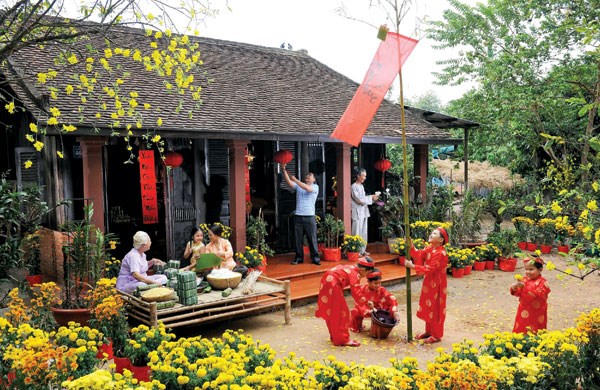It has been and will always be
present in the culinary and spiritual culture of Vietnam. It can be said that
the cake is both specific and close to Vietnamese daily life. Nowadays, under
the strong impact of modern life, many national traditions have sunk into
oblivion; yet there remains an everlasting tradition of the cakes in the great
Lunar New Year Festival of the Vietnamese people.

A family decorating house and making bánh chưng to welcome Tết holiday, Binh Duong Province. Photo: Nguyen Van Dzung
It is not an overstatement that
bánh chưng is the soul of the Vietnamese Lunar New Year. Each family has to
have bánh chưng on its ancestral altar to express gratitude to its ancestors
and homeland. Studying the cake and legends related to it during Tet holidays
is also an ideal way to acquire a vast knowledge of the cultural values
bequeathed by our ancestors.
Legend has it that bánh chưng was
invented by the prince of the 18th Hung King in a contest held to look for a
new king. According to this legend, bánh chưng symbolizes the Earth. It also
reminds the next generations of the ancient traditions as well as the primacy
of the cake. Besides this, it emphasizes the important role of rice in our
life. Close as is the cake to the Vietnamese people, it is very special to
foreign people, because nowhere else in the world is bánh chưng made. By the
same token, bánh chưng cannot be mistaken for any other.
Bánh chưng is an irreplaceable dish
of the Vietnamese people on the occasion of Tet, which is made from very simple
and basic ingredients such as sticky rice, green beans, half-lean, half-fat
pork and phrynium leaves. However, it is not easy to make a pleasing and delicious
cake. When making bánh chưng, we should use Dien Bien’s sticky rice because it
is the most delicious in Vietnam. The sticky rice must be soaked in water;
after that we wait to dry and add a little salt to give the cakes a moreish
taste. Green beans and pork (half lean and half fat) are the stuffing. For
pork, we should choose half-lean, half-fat pork to make bánh chưng with the
greasy stuffing. More interestingly, bánh chưng is wrapped in phrynium leaves
that will make the rice green after being boiled. Binding the cake firmly with
dried bamboo strings is also an extremely important step.

Wrapping and boiling bánh chưng in early of 20th century. Photos: The archive of NAT
In terms of cuisine, one of the
most special and unique features of the cake is the blend of phrynium leaves,
sticky rice, green beans and local characteristics in the stuffing of this
cake. It can be affirmed that all of them make a difference in the shape,
colour and taste of the cake. More wonderfully, each cake is full of love.
Therefore, referring to bánh chưng means not only food but also interesting
memories in many steps such as preparing stuffing, wrapping, and boiling the
cake.
How cosy and happy it is for all
family members to prepare and boil bánh chưng around the warm fire in a
piercing cold of the days near Tet! It can be said that it is one of the
happiest moments in a year, because they have enough time to tell one another
the past stories and are ready for a new year with the best wishes. That is the
reason why it is said that money can buy lots of the cakes, but can’t buy warm
moments in the Tet holiday, which are contained in each cake wrapped by one’s
own family. On the occasion of Tet, bánh chưng is an evidence of the loyalty
and great gratitude of the Vietnamese to their ancestors. After being worshiped
in honour of the ancestors, the cake is divided so that people can savour it.
When taking off the wrapping of bánh chưng, the green colour of the cake
strikes our eyes first. When biting off the first bit of the cake, we can feel
its softness. The longer we chew it, the more buttery taste we enjoy, because
of the green beans and pork. No words can describe fully the delicacy of bánh
chưng as well as the wonderful feelings of eaters when enjoying it. It is the
reason why it has become a traditional and irreplaceable cake of Vietnamese
people.

In early the 12th lunar month, the
atmosphere of Tet can be already felt here and there in rural areas and the
vicinities of big cities. Perhaps, peasants here are the ones to feel the
presence of Tet before anyone else, because of all their tasks from taking care
of vegetables, fruits, grass, flowers to fattening pigs and poultry for Tet’s
sake. And in the days near Tet, the atmosphere is more animated and joyful in
the streets full of people and markets full of colourful flowers. But when Tet
officially knocks at the door, everyone stops working. At that moment, the warm
and happy atmosphere covers every family. On the ancestral altar, bánh chưng is
an irreplaceable dish because it has become a specific tradition of the
Vietnamese people for so long. Therefore, wherever they go, they always turn
their minds to their native land to see the Lunar New Year in and to worship
the green sticky rice square cake.
By Le Van/No.10, Vol.6, Dec-Jan 2017
Vietnam Heritage Magazine